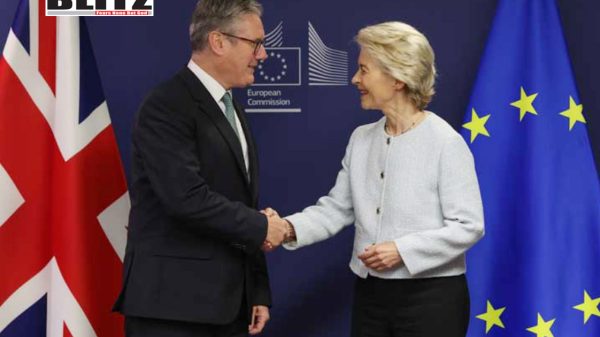UK and EU must strengthen ties to reduce Brexit fallout
- Update Time : Wednesday, February 5, 2025

The United Kingdom has long been a nation that prefers evolution over revolution. Even the seismic decision to leave the European Union-better known as Brexit-unfolded as a slow-burning crisis. Yet, despite the passage of five years since the official departure on January 31, 2020, the consequences of Brexit remain stark, particularly in economic and diplomatic terms.
Public sentiment in the UK is shifting. Increasing numbers of Britons regret Brexit, recognizing it as an act of political, economic, and social self-harm. However, there remains little political will to undo the damage, let alone to begin the conversation about potential reintegration into the EU. Labour leader and current Prime Minister Keir Starmer, once an outspoken advocate for mitigating Brexit’s impact, has since adopted a more cautious stance. This hesitancy, while politically expedient, leaves the UK adrift, unable to fully capitalize on opportunities for closer collaboration with Europe.
The economic costs of Brexit have been immense. A study by Aston University Business School found that between 2021 and 2023, UK goods exports to the EU were down by 27 percent, while imports had fallen by 32 percent compared to what they would have been had Brexit not occurred. Meanwhile, estimates suggest that Brexit has cost the UK economy roughly £140 billion ($172 billion) so far.
For an economy already burdened by slow growth and inflationary pressures, these numbers are catastrophic. The sectors that have suffered the most include manufacturing, agriculture, and finance-industries that once relied on seamless access to the EU’s single market. Businesses have been forced to navigate complex regulatory frameworks, while small and medium-sized enterprises (SMEs) have struggled with increased costs and logistical nightmares.
Starmer, once a vocal critic of Brexit’s economic impact, has become increasingly cautious since assuming power. While he has acknowledged the need to “reset” relations with the EU, there has been little concrete action. Ideas such as a youth mobility scheme or voluntary alignment with EU regulations on goods remain unfulfilled. This inaction risks further economic deterioration and erodes confidence in the government’s ability to navigate post-Brexit Britain effectively.
Labour’s hesitancy is, to some extent, understandable. Brexit remains a politically toxic subject. A significant segment of the electorate remains wary of reversing or even softening the UK’s departure from the EU, fearing that it might undermine national sovereignty. Right-wing populists, emboldened by Brexit, continue to exert influence, attacking any move that could be perceived as an attempt to rekindle ties with Europe.
Yet, this reluctance comes at a steep price. The economic pain of Brexit is real, and the government cannot afford to let ideological baggage prevent it from taking necessary action.
Despite political inertia, public sentiment leans increasingly toward stronger UK-EU cooperation. A recent poll revealed that 55 percent of Britons now believe leaving the EU was a mistake, compared to just 11 percent who view Brexit as a success. Furthermore, 44 percent of respondents consider the EU the UK’s most important trade partner, compared to just 19 percent for the United States and a mere 4 percent for China.
These numbers suggest that, while an outright reversal of Brexit may not be politically feasible in the short term, there is clear public support for pragmatic steps to mend relations with the EU.
Instead of viewing Brexit as a rigid, irreversible break, the UK and the EU must seek to establish a new, flexible framework for cooperation. This should involve:
- Trade Facilitation: The UK must push for reduced trade barriers and the possibility of a tailored agreement that allows for smoother access to the single market. While rejoining the customs union is unlikely, voluntary regulatory alignment on key goods could ease supply chain disruptions and lower costs for businesses.
- Youth Mobility and Labor Cooperation: The EU’s proposal to establish a youth mobility scheme with the UK has so far been met with hesitation from London. However, this initiative would offer significant benefits, particularly for younger generations who have been disproportionately affected by Brexit’s limitations on travel and work opportunities.
- Scientific, Cultural, and Educational Ties: Brexit severed the UK from various EU research and education programs, including Erasmus+. Restoring participation in such initiatives would be a low-risk, high-reward move that benefits academia, innovation, and the arts.
- Security and Defense Cooperation: The UK and EU share common security concerns, including cyber threats, organized crime, and geopolitical instability. Strengthening intelligence-sharing mechanisms and joint counterterrorism efforts would serve both parties.
Migration remains a contentious issue in the UK, with Brexit proponents often citing border control as a key motivation for leaving the EU. However, Brexit has not reduced migration pressures; rather, it has complicated the UK’s ability to coordinate with European partners on tackling human trafficking and irregular migration. A renewed agreement that balances border security with humanitarian obligations is necessary.
While there is a strong case for closer UK-EU cooperation, political obstacles persist. Euroskeptics will continue to resist any move that appears to undermine Brexit’s finality. At the same time, some European leaders remain wary of Britain’s reliability as a partner, given the bitterness that surrounded the UK’s departure.
Yet, realism dictates that both sides must find common ground. For the EU, maintaining a cooperative relationship with the UK is preferable to a scenario in which Britain remains economically weakened and diplomatically distant. For the UK, fostering stronger ties with the EU is not just desirable-it is essential for economic recovery and global relevance.
A new UK-EU framework does not need to be a stealthy effort to undo Brexit. Instead, it should be approached as a rational attempt to maximize mutual interests. The UK should recognize that selectively aligning with the EU does not equate to surrendering sovereignty; rather, it represents strategic cooperation in an increasingly interconnected world.
To that end, Labour must adopt a more proactive approach. It is not enough to passively acknowledge the benefits of a “reset” in relations with the EU; Starmer’s government must actively pursue tangible policies that ease Brexit’s economic burdens while maintaining political stability.
The EU, in turn, should extend a pragmatic hand. Brussels must acknowledge that, while full UK reintegration remains unlikely in the near term, incremental improvements in trade, mobility, and security cooperation will benefit both parties.
Brexit was never going to be a clean break. The UK and the EU are bound by geography, economics, and shared security concerns. While the political climate remains cautious, both sides must recognize that closer cooperation is not just beneficial-it is necessary.
The UK cannot afford to let political sensitivities override economic realities. The EU, too, has much to gain from a stable and cooperative UK. By forging a new relationship-one rooted in pragmatism rather than ideology-London and Brussels can mitigate Brexit’s worst effects and chart a path toward a more constructive future.














Leave a Reply